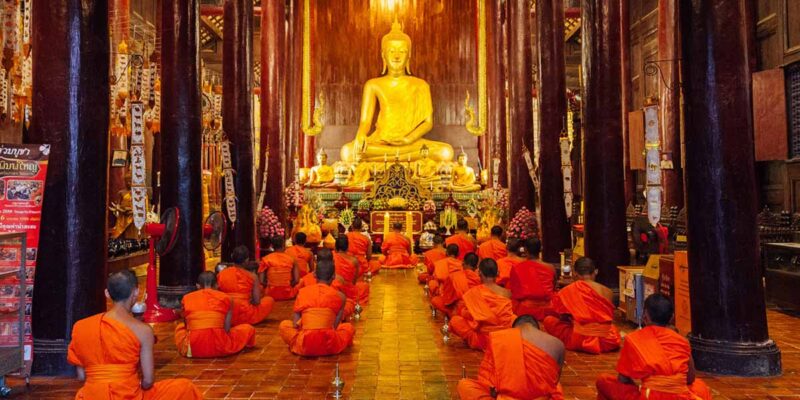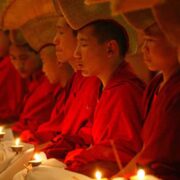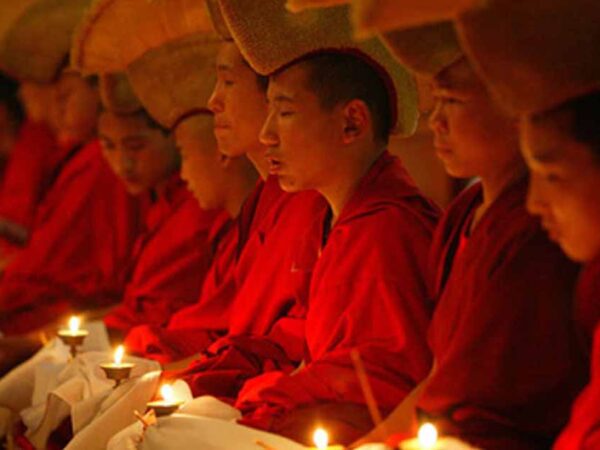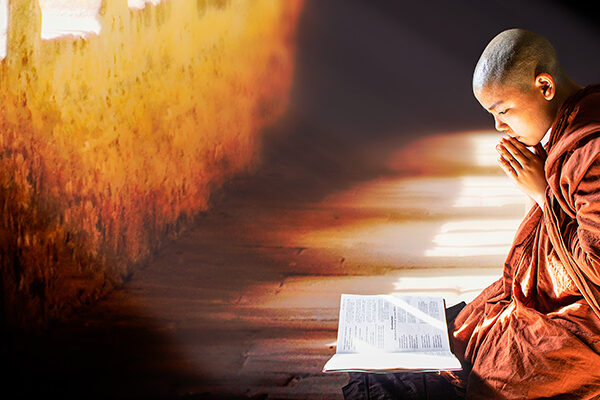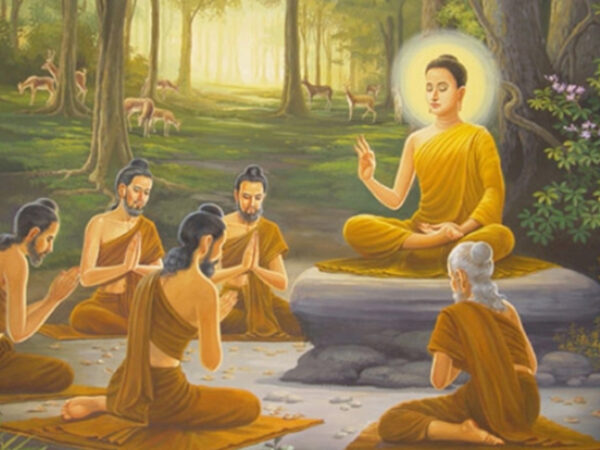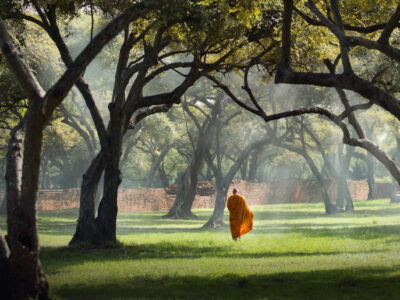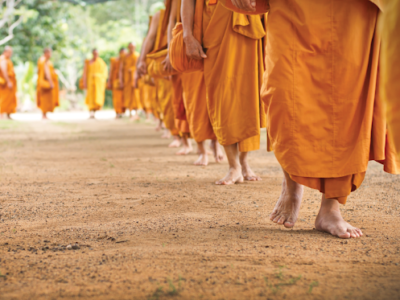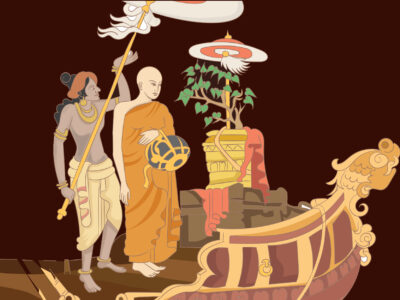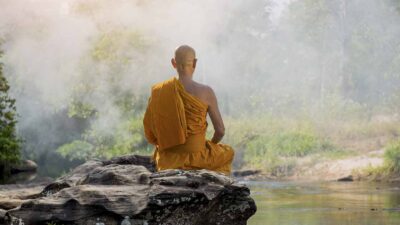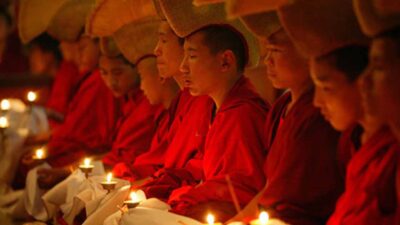At the very outset it must be stated in unequivocal terms that Buddhism is definitely against any kind of war, violence and armament and is absolutely for peace.
Buddhism is based on Great Compassion (maha-karuna) and Great Wisdom (maha-prajna) Generally speaking, compassion here represents love, charity, kindness, pity, tolerance and such noble qualities on the emotional side of qualities of the heart, while wisdom would stand for the intellectual side, ability to see things as they are or the qualities of the mind, to be perfect one has to develop both equally.
Buddhist ethical conduct which includes social, economic and political system is built on the vast conception of universal love and compassion for all living beings on which the Buddha’s teaching is based. It is regrettable that many scholars forget this great ideal of the Buddha’s teaching, and indulge in only dry philosophical and metaphysical divagations when they talk and write about Buddhism. The Buddha gave his teaching for the good of the many, for the happiness of the many, out of compassion for the world. (bahujana hitaya, bahujanasukhaya, lokanukampaya).
Now, in the Ethical conduct, based on love and compassion, is included Right Livelihood (No. 5 of the Noble Eightfold Path). Right Livelihood means that one should abstain from making one’s living through a profession that brings harm to others, much as making and trading in arms, deadly poisons and lethal weapons, and should live by a profession which is honourable, blameless not of harm to others. One can clearly see here that Buddhism is strongly opposed to any kind of war, when it lays down that trade in arms, poisons and lethal weapons is an evil and unjust means of livelihood.
Buddhism considers life as sacred and treats it with the highest regard and respect. The first precept for a Buddhist is to abstain from destroying life not only human life, but also animal life. (panatipata veramani sikkhapadam)
All tremble at weapons, all fear death, comparing others with oneself, one should not kill, nor cause to kill’ says the Buddha, (Dhammapada verse 129).
Thoughts of love and compassion expressed in the famous Discourse on Universal love (Metta – Sutta) are limitless. ‘May all beings be happy and secure’ is its key-note. Just as a mother would protect her only child even at the risk of her own life, even so let one cultivate a boundless heart towards all beings.
The world today lives in constant fear, suspicion and tension. Science has produced weapons which are capable of unimaginable destruction. Brandishing these latest instruments of death, great powers threaten and challenge one another, boasting shamelessly that one could create misery in the world than the other. Are they sane? Is their behavior different from that of lunatics? Can people have any faith in or respect for such leaders?
They have gone along this path of madness to such a point, now if they take one more step forward in that direction, even by error, the result will be nothing but mutual annihilation along with the destruction of humanity – an unthinkable global holocaust.
Human beings in fear of the situation they have themselves created want to find a way out, and seek some kind of solution. But there is none Buddha – his message of non-violence and peace, of love and except that held out by the compassion, of tolerance and understanding, of truth and wisdom of respect and regard for life, of freedom from selfishness, hatred and cruelty.
The Buddha says: ‘Hatred is never appeased by hatred in this world; it is appeased by love. This is an eternal law. (Dhammpada verse 5).
One should win anger with kindness, wickedness with goodness, the miser with liberality and the liar with truthfulness’, (Dhammapada, verse 223).
There can be no peace or happiness for man as long as he desires and thirsts for conquering and subjugating his neighbor. As the Buddha says; “The conqueror breeds hatred and the defeated lies down in misery. He who renounces both victory and defeat is happy and peaceful. (Dhammapada verse 201). The only conquest that brings peace and happiness is self – conquest ‘One may conquer in battle thousand times a thousand men (million), but he who conquers himself, only himself, is the best of conquerors. (Dhammapada, verse 103)
You will say this is all very beautiful, noble and sublime but not practical. Is it practical to hate one another? To kill one another, to live in eternal fear and suspicion like wild animals in a jungle? Is this more practical and comfortable? Was hatred ever appeased by hatred? Was evil ever won ever by evil?
But there are examples, at least in individual cases, where hatred is appeased by love and kindness, evil won over by goodness. You will say that this may be true; practicable in individual cases, but that it never works in national and international affairs. People are psychologically deceived, hypnotized, puzzled and blinded by the political and propaganda use of such terms as ‘national’, international or state.
What is a nation but a vast conglomeration of individuals? A nation or a state does not think or act. It is the individual who thinks and acts. What the individual thinks and does is what the nation of the state thinks and does. What is applicable to the individual is applicable to the nation or the state. If hatred can be appeased, kindness of the individual scale, surely it can be realized on the national and international scale too. Even in the case of a single person, to meet hatred with kindliness one must have tremendous courage, boldness, faith and confidence in moral force. May it not be even more so with regard to national and international affairs?
If by the expression of practical you mean not easy, you are right. Definitely it is not easy. Yet it should be tried. You may say it is risky trying it. Surely it cannot be more risky than trying a nuclear war.
It is a consolation and inspiration to think today that at least there was one great ruler, well-known in history, who had the courage, the confidence and vision to apply this teaching of non-violence, peace and love to the administration of a vast empire, in both internal and external affairs – Asoka, the great Buddhist emperor of India (3rd century BC), Beloved of the Gods as he was called.
At first Asoka was not a Buddhist and followed the example of his father (Bindusara) and grandfather (Chandraguptha) and wished to complete the conquest of the Indian peninsula. Referring to his conquest of Kalinga, the Emperor publicly expressed his ‘repentance’ and said how extremely painful’ it was for him to think of that carnage. He publicly declared that he would never draw his sword again or any conquest, but that he wishes all living beings non-violence, self-control, the practice of serenity and mildness’ and that he considered ‘conquest by piety’ (dharma-vijaya) as the chief conquest. ‘This is good for this world and the world beyond’, he said. This mental and spiritual revolution was the result of his conversion to Buddhism.
This is the only example in the history of mankind of a victorious conqueror at the zenith of his power, still possessing the strength to continue his territorial conquest, yet renouncing war and violence and turning to peace and non-violence.
Here is a lesson for the world today. The ruler of an empire publicly turned his back on war and violence, and embraced the message of non-violence and peace, and created out of his empire the first, welfare state in world history. There is no historical evidence to show that any neighbouring king took advantage of Asoka to attack him militarily or that there was any revolt or rebellion within his empire during his lifetime. On the contrary, there was peace throughout the land, and even countries outside his empire seem to have accepted his benign leadership.
Powerful nation today are fabulously rich and their military might is incredible. But morally they are lamentably poor and bankrupt and cowardly. What is their achievement except the achievement of power to destroy humanity? With all their wealth and power, could they make the world live in peace and happiness, from fear of destruction? If they are not mad they must be ashamed of themselves.
Talking about limited disarmament is laughable. It means agreeing to kill and destroy only to some extent, bus not to destroy whole humanity, it must be stated categorical disbursement and peace are heartless and insincere.
To talk of maintaining peace through the balance of power, or through the threat of nuclear deterrents, is foolish. The might of armaments can only produce fear, and not peace, it is impossible that there be genuine and lasting peace through fear. Hatred, ill-will and hostility which rise through fear will be suppressed perhaps for the time being only but will be ready to erupt and become violent at any moment. True and genuine peace can prevail only in an atmosphere of metta, amity, free from fear, suspicion and danger.
By the Ven. Prof. Dr. Walpola Sri Rahula
Chancellor, University of Kelaniya, Sri Lanka

